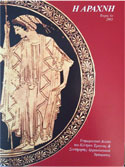august's word: hydatina rake
The term ῥάκος (more often in plur. ῥάκεα, ῥάκη) in oldest times was written and pronounced ϝράκος.In the aeolian dialect the ϝ has been maintained, but rendered by the Alexandrine grammarians as β (bilabial /b/ similar to the English w). This is why we see in Sappho βράκος (ῥάκος), βραδίως (ῥαδίως) etc.
Usually, it has the same meaning as in Modern Greek, rag:
Od. 6.178 δὸς ῥάκος ἀμφιβαλέσθαι “give me a rag to wear”; Isocr. L. 9 ἐνίας δ᾽αὐτῶν ἐν ῥάκεσι περιφθειρομένας δι᾽ἔνδειαν, “they are so poor they ended up wearing rugs”; Callimachus, Fr. 241.1 αὐτόθεν ἐξ εὐνῆς ὀλίγον ῥάκος αἰθύξασα…, “after she had shaken the small rag on the bed…”.
In other texts, for instance in Sappho (as well as her imitators in the Alexandrine period), it has the meaning of a long woman’s dress ἱμάτιον πολυτελές (Hesychius): Sappho Fr. 57 οὐκ ἐπισταμένα τὰ βράκε’ ἔλκην ἐπὶ τῶν σφυρῶν “[this peasant woman] who doesn’t know how to put her dress around her legs”; Theocritus Idyllia 28.11 πόλλα δ’ οἶα γύναικες φορέοισ’ ὐδάτινα βράκη,“and threads for transparent women’s dresses”; Callimachus Fr. 295 ὑδάτινον καίρωμα ὑμένεσσιν ὅμοιον [Eustathius Od. Η p. 273 καὶ τὸ Δηλίων ὕφασμα ὑδάτινον καίρωμα] ”dense and fine like a membrane”, see also Antipatrus A. Pal. 9.567 ὑδατίνους φορέουσα βραχίονας.
Perhaps, apart of transparent, we should think of the term as referring to something wavy, like the stream that waves in the breeze or the waves of the sea.
Note: Although the etymology for the term ῥάκος is common, the meaning was developed in two different ways (bad/beautiful).
We don’t have to dwell on the term ὑδάτινος, ὕδωρ, --ατος (water)> ὑδάτ-ινος.


